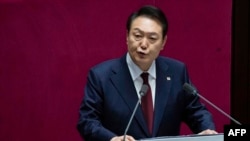The United States, South Korea, and Japan vowed to strengthen cooperation and increase deterrence measures ahead of an expected nuclear test by North Korea.
The commitment came during a meeting Wednesday in Tokyo between senior leaders from the United States, South Korea, and Japan.
“We agreed that an unparalleled scale of response would be necessary if North Korea pushes ahead with a seventh nuclear test,” said South Korean Vice Foreign Minister Cho Hyun-dong.
North Korea this year has launched a record-high number of missiles, including a ballistic missile that flew over Japan earlier this month.
On Tuesday, South Korean President Yoon Suk Yeol said Pyongyang has finished preparations for a nuclear test, which would be its seventh since 2006.
The North’s weapons tests have driven South Korea and Japan closer, despite ongoing tension related to Japan’s brutal occupation of Korea before World War II.
"Given the possibility of further provocations including nuclear tests, we have agreed that…we will strengthen our regional capability of deterrence…and work closely together from the perspectives of diplomatic efforts,” said Takeo Mori, Japan’s vice minister for Foreign Affairs.
U.S. Deputy Secretary of State Wendy Sherman urged North Korea to “refrain from further provocations” and said the United States remains committed to dialogue without preconditions.”
Sherman also reiterated Washington’s “ironclad” commitment to defend Japan and South Korea, which she said were “clearly bound together by common security interest.”
Japan-South Korea relations have suffered for several years in part because of legal disputes over Japan’s wartime use of forced labor in Korea.
However, South Korean President Yoon, who took office in May, said he wants to improve ties and has overseen expanded security cooperation with Tokyo.
Earlier this month, South Korean, Japanese and U.S. warships held a ballistic missile defense exercise in the waters between Korea and Japan. In late September, South Korea, Japan, and the United States conducted their first trilateral anti-submarine drills in about five years.








